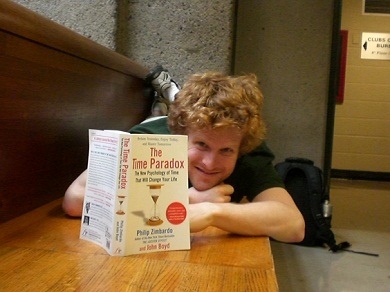 I recently finished a fascinating read. The Time Paradox
I recently finished a fascinating read. The Time Paradox is a book by Philip Zimbardo and John Boyd about how our personal perspectives of time have a tremendous effect on how we live our lives.
You have have heard of Zimbardo before, he is one of the more famous social scientists in the world thanks mostly to his fame for conducting the Stanford Prison Experiment. He has written a major work on the subject of “Understanding how good people turn evil”. On the first page of my copy, he says that writing this book, The Lucifer Effect, was not a labour of love. I find this understandable; investigating the ways in which human beings can be turned evil is an extremely dark subject. I think the world owes Zimbardo thanks for pushing through the mire to discover how we can reorient our institutions towards bringing out the good in all of us rather than the evil.
I had the pleasure of meeting Dr. Zimbardo briefly during his visit to Regina in November 2009. While I was pretty sure that his presentations would be good, I didn’t expect to be blown away by how caring and conscientious of a person he was. I observed him in person-to-person interactions far from the stage in which he was extremely kind, caring and patient with every person who asked him a question or for advice. I thought to myself, here is a man whose time is very valuable, giving it away to people because…well I hesitate to speculate…but I think he really just wants to help people. Even after a five-decade teaching career in prestigious universities, he still cares about people he meets on the street. I was profoundly moved by this experience.
Now, back to The Time Paradox.
Overall, this book was transformative and challenging. It lead me to understandings about my life, and the lives of those around me, that are profound and clear. I originally thought that I probably would not learn very much from the book, being a reasonably thoughtful metacognitive person. I turned out to be wrong, and this book fundamentally changed the way I look at the world.
What perspective did I gain from this book?
Time perspectives are important. A significant part of the book is dedicated to making clear just how important they are. What also comes along with that knowledge is a firm understanding of how far reaching the consequences of ignorance about time perspectives can be.
Time orientation is a fundamental life perspective. Anyone reading this article of mine will have no trouble understanding the different ways of looking at time presented in the book. The perspectives in the book are roughly based on positive and negative views of the past, present, and future.
The question for each of us is: Which time perspectives do you live, and how do they affect your life?
Respect for differences
Throughout the book there is a genuine respect for the fact that while social science can collect general data about the results of habits that people have, it cannot predict the outcomes for any one individual. The wisdom of this book must be applied by each person to their own personal context.
Time therapy (applying the ideas from this book in the field of clinical psychology) seems to be incredibly powerful. However, for me the most important aspects of this book are those that have to do with each of us as individuals. Each of us lives our own journey through time, and this book is a good step towards understanding ourselves a bit better.
Balance is the key
There is no cookie-cutter solution to perspectives of life. The best answer is not any particular time perspective, but a combination of all. The authors espouse a very balanced time perspective based on the best data that they have.
What does a ‘balanced time perspective’ mean? Well first of all it means that there is more than one time perspective present, because fixation on any single time perspective tends to lead to large problems in life. Fixation on only one perspective means you are missing out on a lot of your own experience and potential.
I would summarize the balanced time perspective as follows. It is a mental and emotional state in which you:
- Regard your future filled with quite a bit of hope, though tempered with the knowledge that you have to spend effort (and thought) now to create a better life for yourself later.
- Keep in mind your happy memories because they help you stay happy and live in a hopeful present, but keep enough realism about the past to learn from mistakes and hardships.
- Live today well, and be happy with the moments you have. Be aware of the central importance of the present moment. Everything happens now and no other time really exists except within our minds. We must live now, but we can also choose to shape our future and call to mind our happiness and lessons from the past.
What about you?
I scored the following on the Zimbardo Time Perspective Inventory.
Past-negative: 2.00
Past-positive: 4.89
Present-hedonistic: 3.80
Present-fatalistic: 1.22
Future: 4.00
Transcendental-future: 3.00
What are you? Take the test here.
Well worth your time
I needed to read this book. The insights I have gained from reading have helped me towards a more balanced and happy life. I firmly believe that this book has the potential to help others do the same.
You can find The Time Paradox for a pretty decent price (and in several different formats such as Hardcover, Softcover, and Kindle Edition) on Amazon.